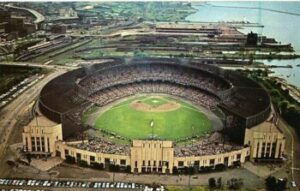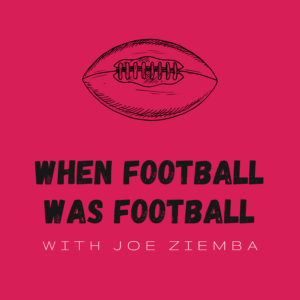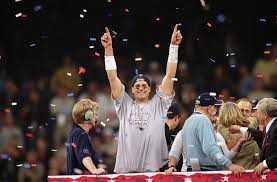July 31, 1932 – The grand opening of Cleveland’s Municipal Stadium took place. The Cleveland Indians christened their new home, in front of more than 76,000 fans. However, the Tribe lost the first game in their new confines, 1-0 to the Philadelphia A’s.
The venue served the franchise as their home from 1932 through the 1993 season. It was also the home to the NFL’s Cleveland Browns and even the Cleveland Rams from 1935 through 1945. Cleveland Stadium, commonly known as Municipal Stadium, Lakefront Stadium was built in the downtown portion of the City near the Lake Erie WaterFront.
Before 1932 the Indians played their games at nearby League Park. In fact from 1932 to 1946 their home games were split between the two venues. In 1994 the Cleveland AL franchise moved into nearby Jacobs Field, which is now called Progressive Field.
To find more great daily sports history make sure to check out the Sports Jersey Dispatch and Pigskin Dispatch.

More From Sports History Network

Chicago Cardinals and the Longest Losing Streak in NFL History
During the early part of the 2021 NFL season, there has been much discussion

Abdullah the Butcher: The Wildman of Sudan
Everything I learned about geography, I learned from pro-wrestling. It’s true. Well, maybe not

Year of the Rocket: Toronto Argonaut History From 1991
It was 1991, and Raghib “Rocket” Ismail was about to be the #1 overall

Unraveling Legends: A Historical Review of the NFL’s Greatest Quarterbacks
The National Football League (NFL) has been a cornerstone of American sports culture since

Minnesota’s Most Winnable Super Bowl (IX)
Every pro football fan knows that the Minnesota Vikings went to four Super Bowls

Boxing Titles: Close But No Cigar
In this episode, I am going to be focusing on several boxers who had

Super Bowl XXII (Broncos vs. Redskins): An Ultimate Recount of the Game
Today we have Super Bowl XXII, which was held on January 31, 1988, between

1971 Dallas Cowboys: Their First Lombardi Victory
Year after year my brother and I waited for our favorite team, the Dallas